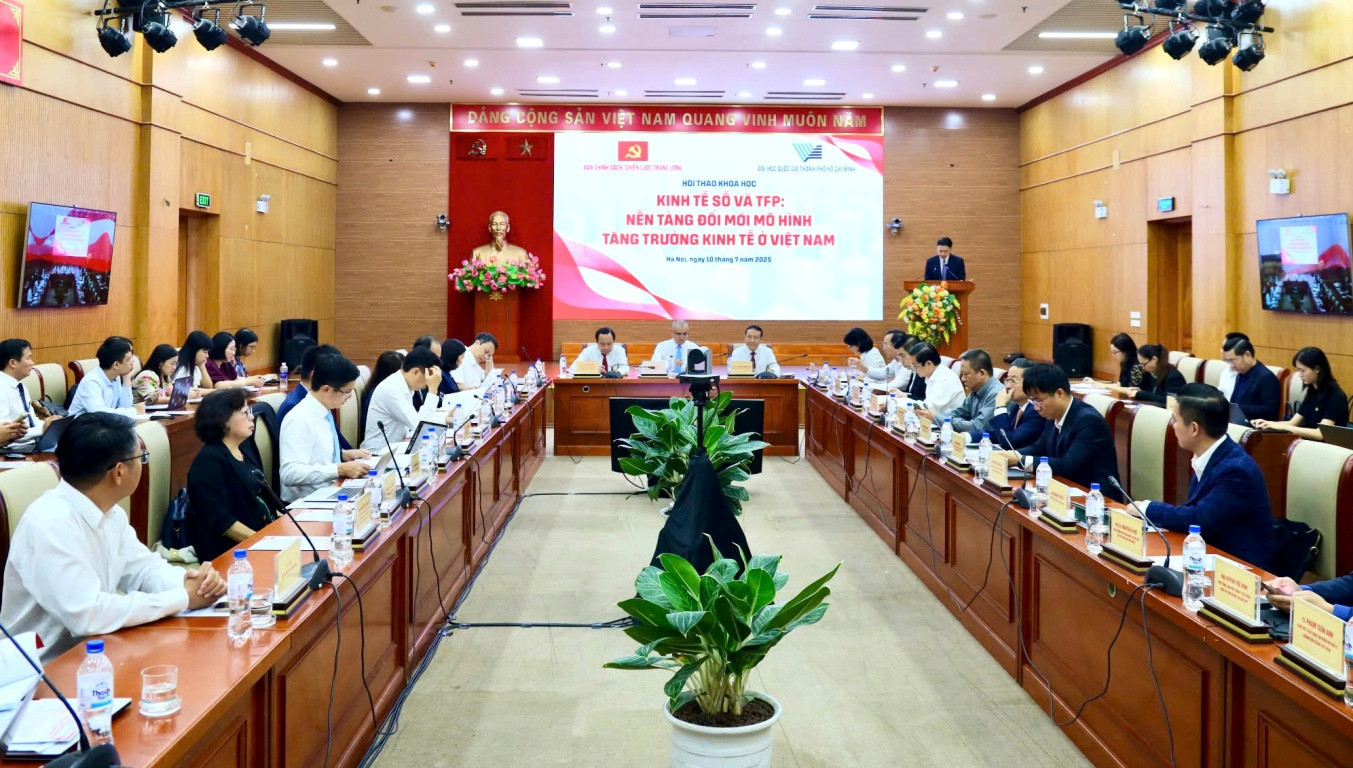Vietnam’s labor productivity remains just one-tenth of Singapore’s and three-quarters that of China’s, highlighting a widening development gap that could persist unless a major transformation occurs.
TFP contributes over 55% to economic growth

At the scientific conference “Digital Economy and TFP: The foundation for innovating Vietnam’s economic growth model” held on July 10, Nguyen Hong Son, Deputy Head of the Central Policy and Strategy Committee, emphasized that for Vietnam to become a developed nation by 2045, it must achieve sustained high growth for many years.
This leaves Vietnam with no choice but to rapidly shift its growth model toward one based on productivity and efficiency.
Son cited specific goals outlined in Resolution No. 57 of the Politburo on science, technology, innovation, and national digital transformation. These include total factor productivity (TFP) contributing more than 55% to economic growth, high-tech exports accounting for at least 50% of total exports, and the digital economy making up 30% of GDP by 2045, with a goal of reaching 50%.
Son added that the Central Policy and Strategy Committee is drafting a strategic plan to promote double-digit economic growth in the new era. At the same time, it is reviewing Resolution No. 05 on key policies for continuing to reform the growth model and improve growth quality, labor productivity, and economic competitiveness.
The focus of this review will be on defining the factors that shape a new growth model for the coming period, with labor productivity and the digital economy as central themes.
According to Professor Tan Swee Liang of Singapore Management University, when capital and labor are already fully utilized, only productivity improvements can drive further output growth. Thus, TFP is the key driver of long-term economic growth.
The digital economy plays a crucial role in boosting TFP by improving R&D, lowering costs, and enhancing governance. Technologies such as automation, big data, IoT, and artificial intelligence (AI) help optimize processes, improve efficiency, and create added value. However, these benefits depend on digital infrastructure, a digitally skilled workforce, innovation readiness among enterprises, and robust institutional frameworks.
Digital transformation to boost labor productivity
Citing data from the International Labour Organization (ILO), Tran Minh Tuan, Director of the Digital and Social Economy Department under the Ministry of Science and Technology, reiterated that Vietnam’s labor productivity stands at just one-tenth of Singapore’s and 75% of China’s. Without strong transformation, the development gap will continue to widen.
To achieve the 2025 economic growth target of 8% and eventually reach double-digit growth, Tuan stressed the urgency of promoting digital transformation among businesses, particularly small and medium enterprises (SMEs), cooperatives, and household businesses.
According to Tuan, digital transformation is not just a trend but a critical driver for raising productivity, reshaping the growth model, and enhancing the competitiveness of the Vietnamese economy.
“For the business community, especially SMEs, cooperatives, and household businesses, digital transformation is not only a solution to challenges but also a major opportunity to boost productivity and generate high added value,” Tuan said.
Discussing the draft proposal on enterprise digital transformation to be submitted to the government, Tuan outlined three main programs.
The first is a program to support digital transformation for SMEs, cooperatives, and household businesses, aiming to improve productivity by 20-30%.
The second program supports digital transformation, technology application, and innovation for these same sectors, with the goal of assisting 50,000 innovative SMEs, 5,000 specialized tech firms, and 500 outstanding AI-driven and technology-transition enterprises.
“These core enterprises will help Vietnam increase localization rates and integrate more deeply into domestic and global value chains,” Tuan added.
A key highlight is a program to support the conversion of 1 million household businesses into formal enterprises, contributing to the implementation of Resolution 68 on private sector development.
To realize this, Tuan proposed several solutions. The Ministry of Finance will lead coordination with relevant ministries, agencies, and local authorities to roll out free basic digital tools and services such as business registration, digital signatures, e-invoicing, and online payments.
On the service platform front, the Ministry of Finance will work with the Ministry of Science and Technology to create a "one-stop shop" integrating all administrative procedures related to digital transformation. This will include legal, accounting, and corporate governance consulting, and link businesses to digital platform providers.
Additionally, the Ministry of Finance will coordinate with relevant agencies to ensure 100% of procedures are handled fully online. The plan includes unified identification through VNeID and a commitment to fast, transparent processing.
Nguyen Le